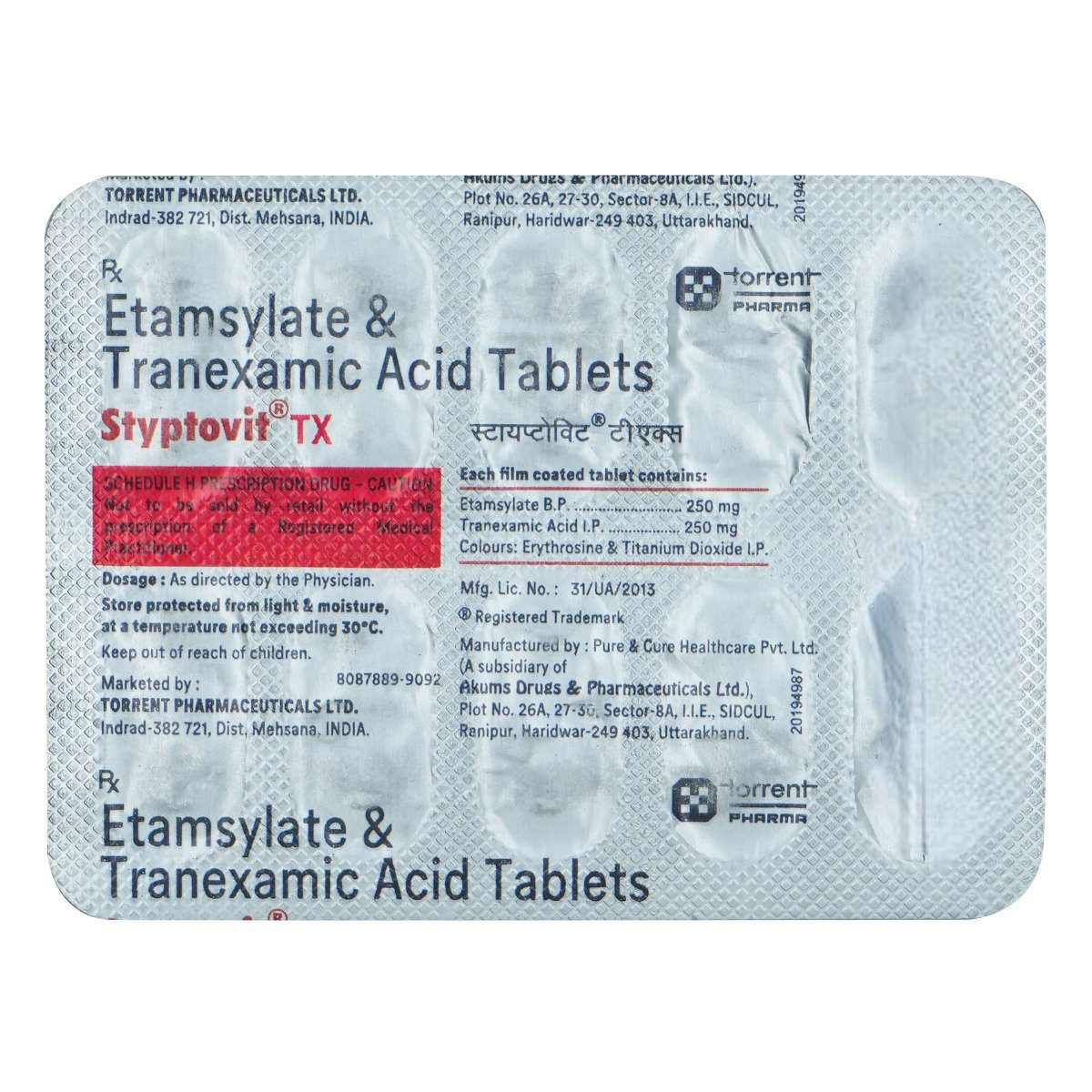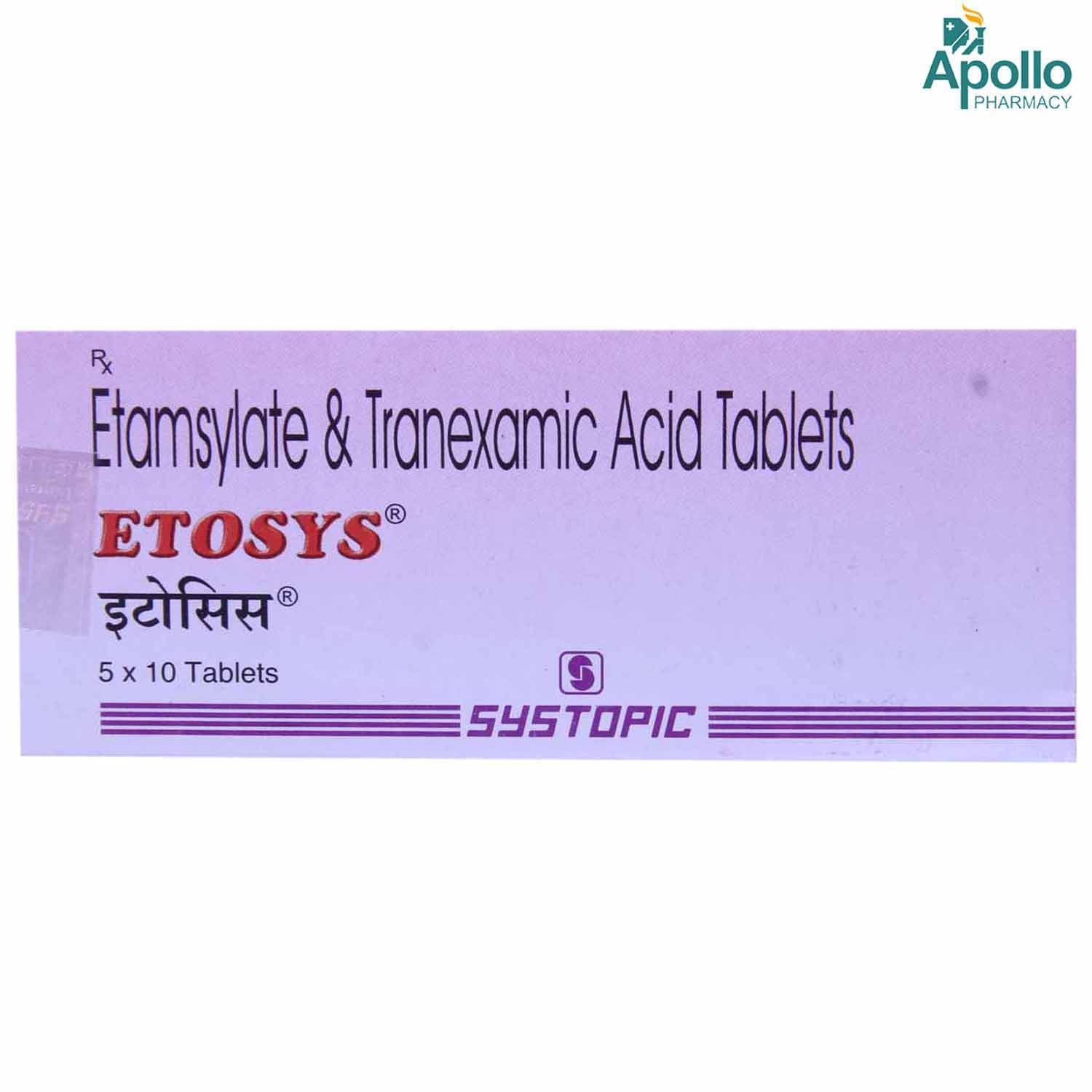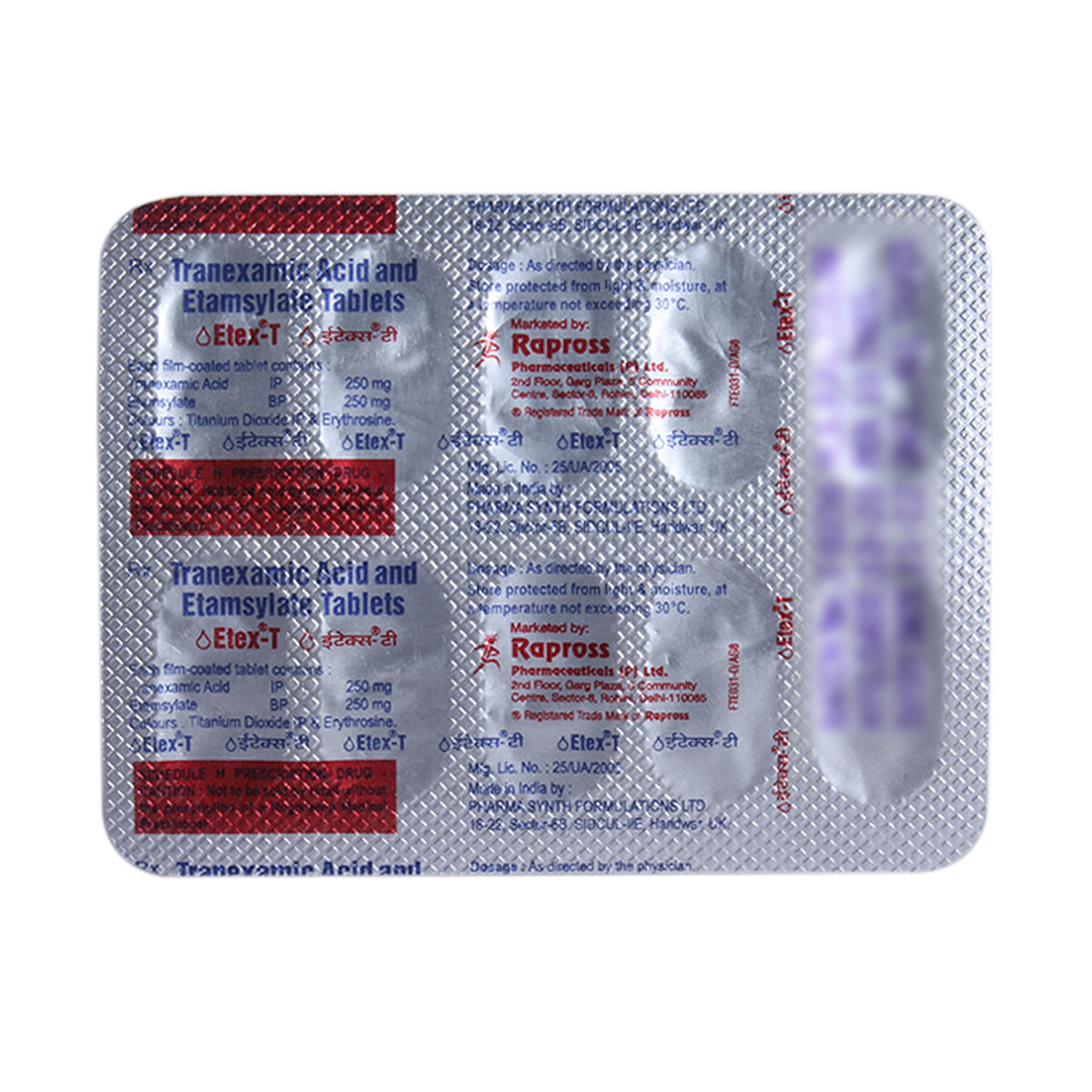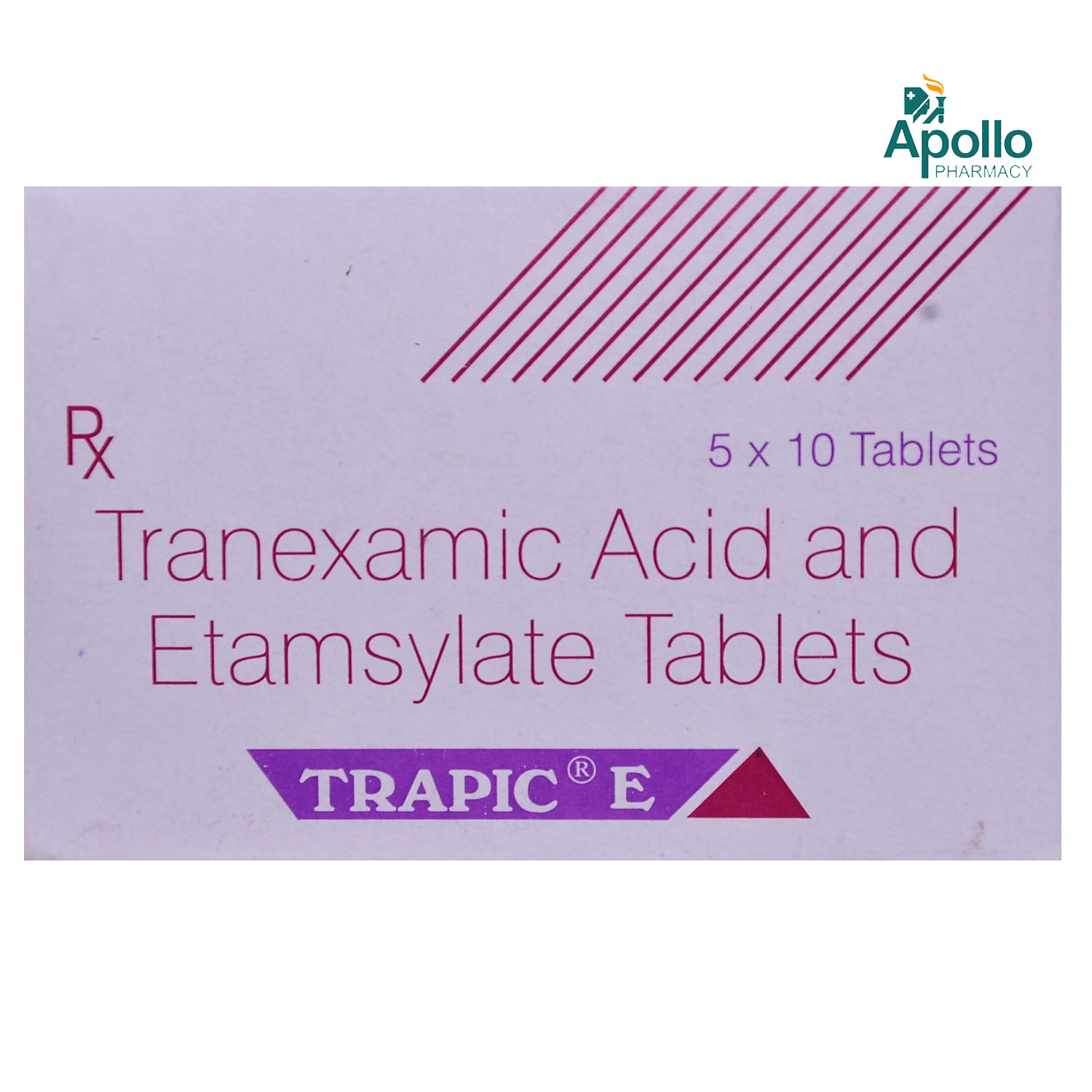Transy E Tablet 10's
MRP ₹250
(Inclusive of all Taxes)
₹37.5 Cashback (15%)
Provide Delivery Location
Online payment accepted
 Prescription drug
Prescription drugWhats That
Composition :
Manufacturer/Marketer :
Consume Type :
Expires on or after :
Return Policy :
About Transy E Tablet
Transy E Tablet belongs to the class of medications called ‘Antihemorrhagic agents’ used to treat menorrhagia. Menorrhagia is a condition characterized by heavy or prolonged bleeding during menstrual periods. You are said to have menorrhagia if the bleeding is heavy to disrupt your daily activities, soaking one or more sanitary pads or tampons every hour for several consecutive hours, bleeding for more than a week, and experiencing symptoms such as fatigue, weakness, pale face, and shortness of breath. It is also used to stop postoperative hemorrhage (excessive bleeding after a surgical procedure), and local fibrinolysis (abnormal breakdown of blood clots)
Transy E Tablet is a combination of two medicines: Tranexamic acid and Etamsylate. Tranexamic acid belongs to the class of ‘anti-fibrinolytic agents’ which acts by regulating the breakdown of blood clots. It blocks the release and action of plasmin, an enzyme essential for the breakdown of clots present in the blood. Etamsylate is a hemostatic agent (prevents bleeding). It increases the ability of platelets to stick together (platelet adhesion) and form blood clots. It inhibits the action of chemical substances that cause the breakdown of platelets. These effects help to decrease abnormal bleeding.
You should take this medicine as prescribed by your doctor. Transy E Tablet may cause side-effects such as nausea, vomiting, diarrhea, stomach pain, fever, chills, rash, severe headache, back or joint pain, muscle pain, difficulty moving, and runny or stuffy nose. These side-effects usually go away without any treatment. If you develop any other serious side-effects such as vision problems while using Transy E Tablet , consult your doctor immediately.
Do not take Transy E Tablet if you are allergic to Tranexamic acid, Etamsylate, and any other ingredients present in it. Do not take this medicine if you have a history of kidney failure, thrombosis (formation of blood clots in the blood vessels), disseminated intravascular coagulation (a disease where blood clots form throughout your body), porphyria (a group of inherited blood disorders), and seizures (fits). Inform your doctor if you are taking birth control pills or fibrinolytic agents (medicines that dissolve blood clots). Also, inform your doctor if you are pregnant or breastfeeding.
Uses of Transy E Tablet
Directions for Use
Key Benefits
Transy E Tablet is a combination of two medicines: Tranexamic acid and Etamsylate. Tranexamic acid belongs to the class of ‘anti-fibrinolytic agents’. It acts by regulating the breakdown of blood clots in the body. It blocks the release and action of plasmin, an enzyme essential for the breakdown of clots present in the blood. Etamsylate increases the ability of platelets to stick together (platelet adhesion) and form blood clots. It inhibits the action of chemical substances that cause the breakdown of platelets. This effect helps to slow down the abnormal bleeding.
Storage
- Drink water or other clear fluids.
- To prevent worsening of pain, limit intake of tea, coffee, or alcohol.
- Include bland foods like rice, toast, crackers, and rice in your diet.
- Avoid lying down immediately after eating as it may cause indigestion or heartburn.
- Avoid acidic and spicy food as it may cause indigestion.
- Talk to your doctor about your back pain and potential medication substitutes or dose changes.
- Try yoga or Pilates and other mild stretching exercises to increase flexibility and strengthen your back muscles.
- To lessen the tension on your back, sit and stand upright and maintain proper posture.
- To alleviate discomfort and minimize inflammation, apply heat or cold packs to the afflicted area.
- Under your doctor's supervision, think about taking over-the-counter painkillers like acetaminophen or ibuprofen.
- Make ergonomic adjustments to your workspace and daily activities to reduce strain on your back.
- To handle tension that could make back pain worse, try stress-reduction methods like deep breathing or meditation.
- Use pillows and a supportive mattress to keep your spine in the right posture as you sleep.
- Back discomfort can worsen by bending, twisting, and heavy lifting.
- Speak with a physical therapist to create a customized training regimen to increase back strength and flexibility.
- Include omega-3 rich foods like fatty fish, ground flax, flaxseed oil, and walnuts.
- Consume calcium-rich dairy products for bone health.
- Eat green and leafy vegetables for essential nutrients.
- Include lean protein sources like eggs and whole grains.
- Use herbs and spices for added flavor and nutrition.
- Choose fortified foods for extra nutritional benefits.
- Get plenty of sleep for overall health and well-being.
- Hydrate your body: Drink enough water to prevent dehydration and headaches.
- Calm Your Mind: Deep breathing and meditation can help you relax and relieve stress.
- Rest and Recharge: Sleep for 7-8 hours to reduce headache triggers.
- Take rest: lie down in a quiet, dark environment.
- Cold or warm compresses can help reduce tension.
- Stay Upright: Maintain good posture to keep symptoms from getting worse.
- To treat headaches naturally, try acupuncture or massage therapy.
- Over-the-counter pain relievers include acetaminophen and ibuprofen.
- Prescription Assistance: Speak with your doctor about more substantial drug alternatives.
- Severe Headaches: Seek emergency medical assistance for sudden, severe headaches.
- Frequent Headaches: If you get reoccurring headaches, consult your doctor.
- Headaches with Symptoms: Seek medical attention if your headaches include fever, disorientation, or weakness.
- Lie down or take a nap in dark and quiet room.
- To avoid dehydration, drink plenty of fluids.
- In case of mild to moderate migraine, you can take over-the-counter pain relievers like paracetamol or ibuprofen.
- Apply an ice pack or cool cloth on your forehead.
- Try relaxation techniques such as yoga, meditation, or deep breathing to reduce stress and relax.
- Avoid foods and drinks that trigger migraine such as chocolate, alcohol, cheese, caffeine, processed meats, artificial sweeteners and dried fruits.
- Manage your stress by eating healthy, exercising and a regular sleep schedule.
- Inform your doctor about the nausea and discuss possible alternatives to the medication or adjustments to the dosage.
- Divide your daily food intake into smaller, more frequent meals to reduce nausea.
- Opt for bland, easily digestible foods like crackers, toast, plain rice, bananas, and applesauce.
- Avoid certain foods that can trigger nausea, such as fatty, greasy, spicy, and smelly foods.
- Drink plenty of fluids, such as water, clear broth, or electrolyte-rich beverages like coconut water or sports drinks.
- Use ginger (tea, ale, or candies) to help relieve nausea.
- Get adequate rest and also avoid strenuous activities that can worsen nausea.
- Talk to your doctor about taking anti-nausea medication if your nausea is severe.
- Record when your nausea occurs, what triggers it, and what provides relief to help you identify patterns and manage your symptoms more effectively.
- Preventing Vomiting (Before it Happens)
- Take medication exactly as prescribed by your doctor. This can help minimize side effects, including vomiting.
- Having a small meal before taking your medication can help reduce nausea and vomiting.
- Talk to your doctor about taking anti-nausea medication along with your prescribed medication.
- Managing Vomiting (If it Happens)
- Try taking ginger in the form of tea, ale, or candy to help alleviate nausea and vomiting.
- What to Do if Vomiting Persists
- Consult your doctor if vomiting continues or worsens, consult the doctor for guidance on adjusting your medication or additional treatment.
Drug Warnings
You should not take this medicine until the underlying cause of menorrhagia is established. Inform your doctor if you are using birth control pills, including the patch, vaginal ring, and an intrauterine device (IUD), as there is a risk of deep vein thrombosis (a condition in which blood clot is formed in the deeper vein, mostly legs). Inform your doctor if you are using fibrinolytic agents (drugs that break blood clots) as they may interfere with the activity of Transy E Tablet .
Drug-Drug Interactions
Drug-Drug Interactions
Login/Sign Up
Taking drospirenone with Transy E Tablet may increase the risk of blood clot formation.
How to manage the interaction:
Taking Transy E Tablet with Drospirenone is not recommended, as it can lead to an interaction but can be taken if prescribed by the doctor. However, If you suffer from chest discomfort, shortness of breath, blood in the urine, blood in the cough, sudden loss of vision, and pain, redness, or swelling in your arm or leg, consult your doctor immediately.
Taking Levonorgestrel with Transy E Tablet may increase the risk of blood clot formation which can lead to serious conditions such as heart problems and kidney failure.
How to manage the interaction:
Taking Transy E Tablet with Levonorgestrel may leads to an interaction but can be taken if prescribed by the doctor. However, if you experience chest pain; shortness of breath; coughing up blood; blood in the urine; sudden loss of vision; and pain, redness, or swelling in your arm or leg, consult the doctor immediately. Do not stop using any medications without talking to a doctor.
Taking Ethinylestradiol with Transy E Tablet may increase the risk of blood clot formation.
How to manage the interaction:
Taking Ethinylestradiol with Transy E Tablet is not recommended, as it can lead to an interaction, but can be taken if a doctor has prescribed it. However, if you suffer from chest discomfort, shortness of breath, blood in the urine, blood in the cough, sudden loss of vision, and pain, redness, or swelling in your arm or leg, consult doctor immediately. Do not stop using any medications without talking to a doctor.
Taking Medroxyprogesterone acetate with Transy E Tablet may increase the risk of blood clots.
How to manage the interaction:
Taking Medroxyprogesterone with Transy E Tablet is not recommended but can be taken if prescribed by a doctor. Consult your doctor immediately if you experience symptoms such as chest pain, shortness of breath, coughing up blood, blood in the urine, sudden loss of vision, and pain, redness, or swelling in your arm or leg. Do not stop using any medications without talking to your doctor.
Co-administration of Transy E Tablet may cause blood clotting when taken with Etonogestrel.
How to manage the interaction:
Taking Transy E Tablet with Etonogestrel is not recommended, as it can lead to an interaction but can be taken if prescribed by the doctor. However, If you suffer from chest discomfort, shortness of breath, blood in the urine, blood in the cough, sudden loss of vision, and pain, redness, or swelling in your arm or leg, consult your doctor immediately.
Using Transy E Tablet together with norethindrone may increase the risk of blood clots.
How to manage the interaction:
Taking norethisterone with Transy E Tablet can lead to an interaction, however, it can be taken only if a doctor has advised it. If you experience symptoms such as chest pain, shortness of breath, coughing up blood, blood in the urine, sudden loss of vision, and pain, redness, or swelling in your arm or leg, contact a doctor immediately .Do not discontinue any medications without consulting a doctor.
Co-administration of Carfilzomib with Transy E Tablet can increase the risk of blood clots.
How to manage the interaction:
Taking carfilzomib with Transy E Tablet is not recommended due to its increased effects, however, it can be taken only if a doctor has advised it. If you experience symptoms such as chest pain, shortness of breath, difficulty breathing, coughing up blood, sudden loss of vision, pain, and numbness or weakness on one side of the body contact a doctor immediately. Do not discontinue any medications without consulting a doctor.
Co-administration of Estramustine with Transy E Tablet can increase the risk of blood clots.
How to manage the interaction:
Taking Estramustine with Transy E Tablet possibly lead to an interaction, however, it can be taken only if a doctor has advised it. If you experience symptoms such as chest pain, shortness of breath, difficulty breathing, coughing up blood, sudden loss of vision, pain, and numbness or weakness on one side of the body contact a doctor immediately. Do not discontinue any medications without consulting a doctor.
Co-administration of tamoxifen with Transy E Tablet can increase the risk of blood clots.
How to manage the interaction:
Although taking tamoxifen and Transy E Tablet together can possibly result in an interaction, it can be taken if your doctor has prescribed it. However, consult the doctor immediately if you experience symptoms such as chest pain, shortness of breath, difficulty breathing, coughing up blood, sudden loss of vision, pain, redness or swelling in an arm or leg, and numbness or weakness on one side of the body. Do not discontinue any medications without consulting a doctor.
Co-administration of tretinoin with Transy E Tablet may increase the risk of blood clots.
How to manage the interaction:
Taking tretinoin with Transy E Tablet is not recommended due to its increased effects, however, it can be taken only if your doctor has advised it. If you experience symptoms such as chest pain, difficulty breathing, coughing up blood, sudden loss of vision, pain, and numbness or weakness on one side of the body contact a doctor immediately. Do not discontinue any medications without consulting a doctor.
Drug-Food Interactions
Drug-Food Interactions
Login/Sign Up
Diet & Lifestyle Advise
- Maintain a healthy weight. Stay physically active.
- Consume fresh fruits and vegetables. Avoid spicy, salty, and deep-fried foods. Eating healthy can help you to recover faster.
- Avoid tea, coffee, and cold drinks.
- Drink plenty of fluids to stay hydrated. Fluids are necessary to maintain blood flow in your body.
- Avoid the intake of alcoholic beverages as it can make you dehydrated and also can affect your sleep.
- Avoid physical and psychological stress.
- Relax in a hot bath, use a heating pad, or take herbal teas to reduce stomach cramps. Massage therapy can also help to reduce cramps.
Side Effects of Transy E Tablet
- Nausea (feeling sick)
- Vomiting (being sick)
- Diarrhea
- Stomach pain
- Swelling of face, lips, eyelids, tongue, hands, and feet
- Dizziness
- Headache
- Chills
- Fever
- Rash
- Pale skin
- Severe headache
- Back or joint pain
- Muscle pain
- Difficulty moving
- Difficulty breathing
- Runny or stuffy nose
Habit Forming
Therapeutic Class
All Substitutes & Brand Comparisons
RX
Alstat TA Tablet 10's
Albert David Ltd
₹22.5
(₹2.25 per unit)
90% CHEAPERRX
Out of StockTheolate Tablet 10's
Leeford Healthcare Ltd
₹150
(₹13.5 per unit)
40% CHEAPERRX
Out of StockEthored-TX Tablet 10's
Leeford Healthcare Ltd
₹165
(₹14.85 per unit)
34% CHEAPER
Drug-Diseases Interactions
Drug-Diseases Interactions
Login/Sign Up
FAQs
Drug-Drug Interactions Checker List
- STREPTOKINASE
- UROKINASE
- RETEPLASE
- ALTEPLASE
- CHLORPROMAZINE
- TRETINOIN
- LEVONORGESTREL
Special Advise
- Transy E Tablet may cause an increase in body temperature in some patients. Contact your doctor immediately if you experience a high fever.
- Transy E Tablet is not recommended for use in patients with a history of any disease where the eye's blood vessels are obstructed due to clot formation.
Disease/Condition Glossary
Menorrhagia: Menorrhagia is heavy bleeding during periods. Symptoms include heavy bleeding that disrupts your daily activities, soaking one or more sanitary pads or tampons every hour for several consecutive hours, bleeding for more than a week, and experiencing anemia symptoms such as fatigue, weakness, pale face, and shortness of breath. It can occur various causes such as hormonal imbalance, ovarian failure, uterine fibroids (benign tumors in the uterus), and cancer of the uterus or cervix.

Have a query?
Alcohol
Safe if prescribed
Consumption of alcohol may worsen your health condition as it may increase the risk of side-effects.
Pregnancy
Consult your doctor
Transy E Tablet is a category B medicine and may not show any toxic effects to the fetus. However, it should be used with caution in pregnant women to avoid unwanted risks and only when prescribed by a doctor.
Breast Feeding
Consult your doctor
Transy E Tablet may get secreted in breast milk in very low amounts. However, it should be used with caution in breastfeeding mothers to avoid unwanted risks and only when prescribed by a doctor.
Driving
Safe if prescribed
Transy E Tablet may not affect your ability to drive.
Liver
Consult your doctor
Transy E Tablet is probably safe in patients with liver diseases. Consult your doctor for further advice.
Kidney
Consult your doctor
Transy E Tablet should be used with caution in patients with kidney diseases. The dose may have to be adjusted by your doctor.
Children
Safe if prescribed
Transy E Tablet is not recommended for use in children.












